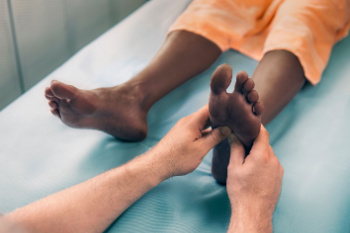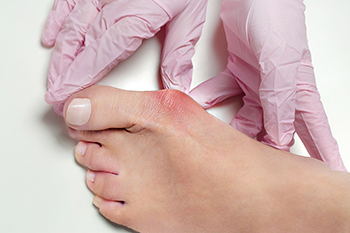Manalapan
(732) 845-0100
Manalapan (732) 845-0100

Midfoot arthritis affects the joints in the arch of the foot, where several small bones meet. It can cause pain, stiffness and swelling, especially during walking or standing. This condition often develops from wear and tear over time, past injuries or inflammatory diseases like rheumatoid arthritis. The pain may feel worse in the morning or after activity, and shoes may start to feel uncomfortable. Treatment focuses on reducing stress on the joints. Wearing supportive shoes, custom orthotics, and anti-inflammatory medications may help manage symptoms. In some cases, targeted exercises or steroid injections provide relief. When pain does not improve, surgery may be considered to fuse the affected joints and restore stability. If you feel pain or stiffness in the middle of your foot that affects daily movement, it is suggested you see a podiatrist for an accurate diagnosis and appropriate treatment.
Arthritis can be a difficult condition to live with. If you are seeking treatment, contact Dr. Charles Marchese from Manalapan Foot & Ankle. Our doctor can provide the care you need to keep you pain-free and on your feet.
Arthritic Foot Care
Arthritis is a term that is commonly used to describe joint pain. The condition itself can occur to anyone of any age, race, or gender, and there are over 100 types of it. Nevertheless, arthritis is more commonly found in women compared to men, and it is also more prevalent in those who are overweight. The causes of arthritis vary depending on which type of arthritis you have. Osteoarthritis for example, is often caused by injury, while rheumatoid arthritis is caused by a misdirected immune system.
Symptoms
Arthritic symptoms range in severity, and they may come and go. Some symptoms stay the same for several years but could potentially get worse with time. Severe cases of arthritis can prevent its sufferers from performing daily activities and make walking difficult.
Risk Factors
If you suspect your arthritis is affecting your feet, it is crucial that you see a podiatrist immediately. Your doctor will be able to address your specific case and help you decide which treatment method is best for you.
If you have any questions, please feel free to contact our office located in Manalapan, NJ . We offer the newest diagnostic and treatment technologies for all your foot care needs.
 The skin on your feet as well as your nails are not immune to melanoma. Also skin and nail
The skin on your feet as well as your nails are not immune to melanoma. Also skin and nail
health is important to overall health. Get checked for melanoma on your feet. Get checked for
tinea pedis (Athletes foot) or nail fungus (onychomycosis). In May we kick off the summer. Soon your feet will be in sandals. Are your feet beach ready?
Make sure your feet are ready for the beach cosmetically and are ready for the increased activity that comes with summer.
If you have any questions, please feel free to contact our offices located in Manalapan, NJ, and Staten Island, NY . We offer the newest diagnostic and treatment technologies for all your foot care needs.

A bunion is a bony bump that forms at the base of the big toe as the top of the toe leans inward toward the others. This deformity develops over time due to pressure on the big toe joint, leading to changes in the bone structure. Common causes of bunions include wearing tight or narrow shoes, genetic predisposition, and conditions like arthritis that affect the joints. Risk factors include having a family history of bunions, flat feet, and occupations that involve long periods of standing or walking. Symptoms of a bunion often include swelling, redness, tenderness, and pain surrounding the big toe joint. Over time, the discomfort can worsen, making it difficult to wear shoes comfortably and affecting overall foot function. If you have a bunion, it is suggested that you are under the care of a podiatrist who can offer treatment options to manage this condition.
If you are suffering from bunions, contact Dr. Charles Marchese of Manalapan Foot & Ankle. Our doctor can provide the care you need to keep you pain-free and on your feet.
What Is a Bunion?
A bunion is formed of swollen tissue or an enlargement of boney growth, usually located at the base joint of the toe that connects to the foot. The swelling occurs due to the bones in the big toe shifting inward, which impacts the other toes of the foot. This causes the area around the base of the big toe to become inflamed and painful.
Why Do Bunions Form?
Genetics – Susceptibility to bunions are often hereditary
Stress on the feet – Poorly fitted and uncomfortable footwear that places stress on feet, such as heels, can worsen existing bunions
How Are Bunions Diagnosed?
Doctors often perform two tests – blood tests and x-rays – when trying to diagnose bunions, especially in the early stages of development. Blood tests help determine if the foot pain is being caused by something else, such as arthritis, while x-rays provide a clear picture of your bone structure to your doctor.
How Are Bunions Treated?
If you have any questions, please feel free to contact our office located in Manalapan, NJ . We offer the newest diagnostic and treatment technologies for all your foot care needs.